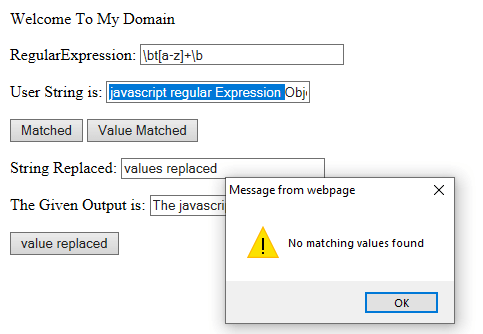Updated October 12, 2023
Introduction to JavaScript String Match
In JavaScript, we already discussed in the previous articles that it has some default methods for creating more sophisticated client-side web applications. Among these, match() is one of the built-in methods for retrieving the data results using a string data type format also comes under the regular expression in JavaScript. A regular expression is one of the objects if suppose regular expression(RegExp) object does not come under this format, i.e.)non-RegExp object it can also be automatically implicitly converted to a RegExp with the help of using new keyword it is used for creating the object. These objects will also be returning the Array as the returning value if sometimes string and array formats return null as the values.
Syntax
The JavaScript in-built methods have their own features and usages of the client-side scripting also; it is more sophisticated under the web-based applications. Among these methods, match() is also the pre-defined method we will see the syntax for these methods.
<html>
<body>
<script>
function functionname()
{
var variablename="";
var v1=variablename.match("strings");
----some javascript logics-----
}
</script>
</body>
</html>The above codes are the basic syntax of the match() method in JavaScript; mainly, the method will pass the regular expression as the arguments which are to be matched with the given strings.
How does JavaScript string match work?
The JavaScript strings will be used for the regular expressions in the comparison process because the string is nothing but the group of characters that are joined together is known as strings. In regular expression is the kind of expression which is used for the sequence of characters that can be defined with the search pattern; the patterns are nothing but the strings, so the pattern search is also known as string search; its also used with the kind of algorithm like find, find and replace these are the two important operations on the strings for user validations.
If suppose we want to know whether the pattern is found with the string datatype matched to use the test() or search() method for more information, we can use the exec() or match() methods, but it uses the slower execution. If we use these methods and find it if the match strings success and these methods will return an array of data types and update their properties, attributes associated with the regular expression object are also the predefined regular expression object using RegExp.If the match value fails, it will use the exec() method and returns the null value.
If we do not access the array type values in the regular expression that is not needed for accessing their properties is an alternative way is there creating an array in the separate variable scripts. The occurrences of the two different statements are using some kind of regular expression objects and hence have a different set of values for using their Index property; if we need to access the properties of the regular expression is already created using their object, which is already initialized we should assign it as the variable. An array having some set of contents that depends on the presence or absence of the global values(flag), or sometimes it can pass the null values. If suppose the string has no set of matches found in the script, the global value is used, and the matched results are using the complete set of regular expressions will be returned with the groups that will display the result as a matched string.
The global value is not set or not matched, or else only the first set of string values are matched, and it has been related to the groups are returned these returned values have their additional properties. The object have their own properties and can be named it as the groups whose the groups are matched using the keys are the names, or sometimes we use the ids have the integer type, and the values are captured using groups or undefined values. Using the index, we have to search the groups, values in the script.
Examples of Javascript String Match
Different examples are mentioned below:
Example #1
Code:
<!DOCTYPE html>
<html>
<body>
<p>Welcome To My Domain</p>
<button onclick="sam()">Please click it</button>
<p id="demo"></p>
<script>
function sam() {
var s = "Welcome To My Domain,Once again the user has welcomed";
var result = s.match(/in/g);
document.getElementById("demo").innerHTML = result;
}
</script>
</body>
</html>Output:
Example #2
Code:
<!DOCTYPE html>
<html>
<body>
<p>Welcome To My Domain</p>
<button onclick="first()">Please click it</button>
<p id="demo"></p>
<script>
function first() {
var s1 = "Welcome To My Domain, Once again the user has welcomed";
var result = s1.match(/in/gi);
document.getElementById("demo").innerHTML = result;
}
</script>
</body>
</html>Output:
Example #3
Code:
<!DOCTYPE html>
<html>
<body>
<p>Welcome To My Domain</p>
<p id="demo"></p>
<FORM ID="first" NAME="first" METHOD=POST ACTION="javascript:void(0)">
<P>RegularExpression: <INPUT TYPE=TEXT NAME="n1" VALUE="\bt[a-z]+\b" SIZE=30></P>
<P>User String is: <INPUT TYPE=TEXT NAME="n2"
VALUE="The javascript regular Expression Object" SIZE=30></P>
<P><INPUT TYPE=SUBMIT VALUE="Matched" ONCLICK="ex()">
<INPUT TYPE=SUBMIT VALUE="Value Matched" ONCLICK="ex2()"></P>
<P>String Replaced: <INPUT TYPE=TEXT NAME="n3" VALUE="values replaced" SIZE=30></P>
<P>The Given Output is: <INPUT TYPE=TEXT NAME="n4"
VALUE="The final result is" SIZE=30></P>
<P><INPUT TYPE=SUBMIT VALUE="value replaced" ONCLICK="ex3()"></P>
</FORM>
<script>
function ex() {
var r = new RegExp(document.first.n1.value);
if (document.first.n2.value.match(r)) {
alert("Values Successfully matched");
} else {
alert("No matching values found");
}
}
function ex2() {
var r = new RegExp(document.first.n1.value);
var ma = r.exec(document.first.n2.value);
if (ma == null) {
alert("No matching values found");
} else {
var s1 = "matching values found " + ma.index + ":\n";
for (i = 0; i < ma.length; i++) {
s1 = s1 + ma[i] + "\n";
}
alert(s1);
}
}
function ex3() {
var r = new RegExp(document.first.n3.value, "g");
document.first.n4.value =
document.first.n2.value.replace(r,
document.first.n3.value);
}
</script>
</body>
</html>Output:
Conclusion
In JavaScript, Regular Expression also copied the strings from one place into another; the regular expression strings do not include the global set of values(flags), so the str.match() method found and will return the same results as the RegExp.exec() method. We also identify whether the string is matched or not using RegExp.test(), and it supports browser compatibility.
Recommended Articles
This is a guide to JavaScript String Match. Here we discuss How does JavaScript string match works and Examples along with the codes and outputs. You may also have a look at the following articles to learn more –







